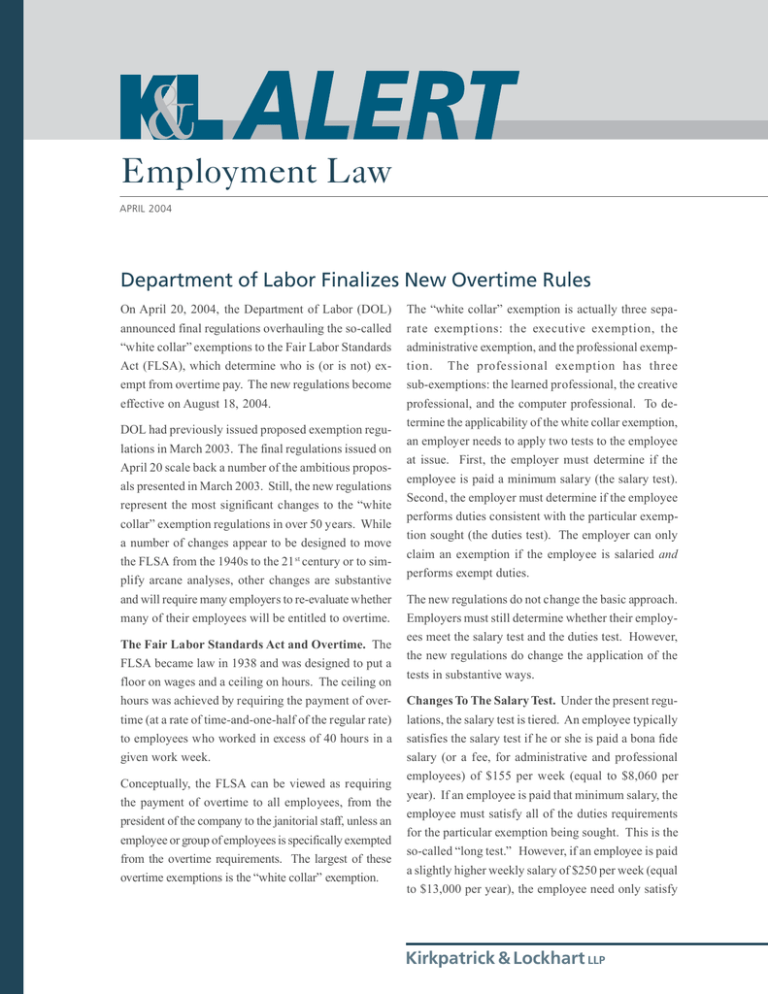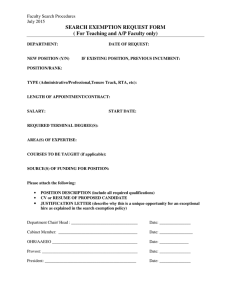
Employment Law
APRIL 2004
Department of Labor Finalizes New Overtime Rules
On April 20, 2004, the Department of Labor (DOL)
announced final regulations overhauling the so-called
“white collar” exemptions to the Fair Labor Standards
Act (FLSA), which determine who is (or is not) exempt from overtime pay. The new regulations become
effective on August 18, 2004.
DOL had previously issued proposed exemption regulations in March 2003. The final regulations issued on
April 20 scale back a number of the ambitious proposals presented in March 2003. Still, the new regulations
represent the most significant changes to the “white
collar” exemption regulations in over 50 years. While
a number of changes appear to be designed to move
the FLSA from the 1940s to the 21 st century or to simplify arcane analyses, other changes are substantive
and will require many employers to re-evaluate whether
many of their employees will be entitled to overtime.
The Fair Labor Standards Act and Overtime. The
FLSA became law in 1938 and was designed to put a
floor on wages and a ceiling on hours. The ceiling on
hours was achieved by requiring the payment of overtime (at a rate of time-and-one-half of the regular rate)
to employees who worked in excess of 40 hours in a
given work week.
Conceptually, the FLSA can be viewed as requiring
the payment of overtime to all employees, from the
president of the company to the janitorial staff, unless an
employee or group of employees is specifically exempted
from the overtime requirements. The largest of these
overtime exemptions is the “white collar” exemption.
The “white collar” exemption is actually three separate exemptions: the executive exemption, the
administrative exemption, and the professional exemption. The professional exemption has three
sub-exemptions: the learned professional, the creative
professional, and the computer professional. To determine the applicability of the white collar exemption,
an employer needs to apply two tests to the employee
at issue. First, the employer must determine if the
employee is paid a minimum salary (the salary test).
Second, the employer must determine if the employee
performs duties consistent with the particular exemption sought (the duties test). The employer can only
claim an exemption if the employee is salaried and
performs exempt duties.
The new regulations do not change the basic approach.
Employers must still determine whether their employees meet the salary test and the duties test. However,
the new regulations do change the application of the
tests in substantive ways.
Changes To The Salary Test. Under the present regulations, the salary test is tiered. An employee typically
satisfies the salary test if he or she is paid a bona fide
salary (or a fee, for administrative and professional
employees) of $155 per week (equal to $8,060 per
year). If an employee is paid that minimum salary, the
employee must satisfy all of the duties requirements
for the particular exemption being sought. This is the
so-called “long test.” However, if an employee is paid
a slightly higher weekly salary of $250 per week (equal
to $13,000 per year), the employee need only satisfy
Kirkpatrick & Lockhart LLP
certain portions of the duties test to qualify for the exemption. This is called the “short test.” As a practical
matter, the salary threshold was set so low that the vast
majority of employees were paid the higher weekly
salary and, to the extent they qualified for the exemption, did so under the short test.
To a large degree, the new regulations do away with
the two-tiered long test/short test approach with a unified
test. In so doing, the new regulations raise the weekly
salary requirement by a significant amount. Pursuant to
the new regulations, only workers earning $455 per week
(or $23,660 per year) in salary may be considered for a
“white collar” exemption. Employees who earn less than
$455 per week are non-exempt without consideration of
their duties (there are exceptions to the minimum salary
for doctors, lawyers and teachers).
The new regulations create a new category of “highly
compensated” employees. Employees who receive total annual compensation of $100,000 or more and who
perform non-manual (white collar) work are exempt
from the FSLA provided that they perform, on a regular and customary basis, at least one duty of an
executive, administrative or professional worker.
Changes to the Duty Test. The regulations proposed
in March 2003 created wholesale changes to the duties tests for the executive, administrative and professional
exemptions. The new regulations scale back those
changes somewhat, perhaps owing to political pressure
and labor lobbying. Nevertheless, the changes made by
the new regulations remain substantial.
As mentioned previously, the short and long duties tests
will be eliminated. Broadly speaking, the duties tests
in the new regulations are less restrictive than the current long tests, but are as (or more) restrictive than the
current short tests. Turning to the executive exemption first, the requirements for the exemption are:
2
■
A primary duty of managing an enterprise or a customarily recognized department or subdivision of
the enterprise;
■
Customary and regular direction of the work of at least
two full-time employees (or their equivalent); and
■
Authority to hire or fire other employees (or to suggest and recommend hiring, firing, advancement,
or promotion where those suggestions and recommendations are given particular weight).
Under the current short test, the authority to hire and
fire was not required of an employee seeking to qualify
for the executive exemption, so the new regulations
could be construed as an expansion of the executive
exemption duties test. Other changes in the new regulations include the elimination of the “sole charge”
exception (which relaxed duty requirements for those
who operate a physically separate enterprise by themselves) and a requirement that those with a 20% equity
ownership in the business “be actively engaged in management” to be considered an executive.
With respect to the administrative exemption, the new
regulations require:
■
A primary duty of performing office or non-manual
work directly related to the management or general
business operations of the employer or the
employer’s customers; and
■
The exercise of discretion and independent judgment in matters of significance.
The March 2003 proposals argued for elimination of the
discretion and independent judgment requirement found
in the current administrative exemption. That proposal
was rejected. Indeed, because the present short test does
not expressly provide that the exercise of discretion and
independent judgment occur in “matters of significance,”
the new regulations’ inclusion of that phrase may suggest
a more stringent test for the administrative exemption.
For the learned professional exemption, the new duties test requires:
■
A primary duty of performing work requiring advanced knowledge, defined as work which is
predominantly intellectual in character and which
includes work requiring the consistent exercise of
discretion and judgment;
■
Advanced knowledge in a field of science or learning;
and
KIRKPATRICK & LOCKHART LLP EMPLOYMENT LAW ALERT
■
Acquisition of the advanced knowledge by a prolonged course of specialized intellectual instruction.
This test is very similar to the current test. The proposed regulations indicated that the requisite advance
knowledge may be obtained by means other than a prolonged course of specialized intellectual instruction,
such as intellectual instruction and work experience,
but the new regulations back away from that position
and focus primarily on knowledge acquired by specialized intellectual instruction.
now. Failure to properly classify employees as exempt or
non-exempt can be costly, as an employer would be liable
for unpaid overtime for up to three years, liquidated damages in an amount equal to the back pay, attorney’s fees
and/or civil penalties for erroneous classification determinations. Accordingly, a prudent employer should
evaluate whether the new regulations require reclassification of its employees.
The new duties test for the creative professional exemption is:
■
A primary duty of performing work requiring invention, imagination, originality or talent in a
recognized field of artistic or creative endeavor.
The new regulations add that work requiring “imagination” may be a basis for claiming the exemption,
but that does not appear to be a substantive change.
As for the computer professional, the exemption remains essentially unchanged. The new regulations do
simplify the test for outside salespersons so that, now,
an employee will be exempt if his or her primary duty
is making sales or obtaining orders or contracts for
services or for the use of facilities for which a consideration will be paid by the client or customer, and if the
employee is customarily and regularly engaged in such
activity away from the employer’s place of business.
In short, the new regulations are not as far-sweeping as
first proposed or as rumored, but they depart from the current regulations in ways significant enough to warrant
reconsideration of whether an employee exempt (or nonexempt) today will still enjoy that status four months from
MICHAEL A. PAVLICK
mpavlick@kl.com
412.355.6275
FOR MORE INFORMATION, please contact one of
the following K&L lawyers:
Boston
Henry T. Goldman
617.951.9156
hgoldman@kl.com
Dallas
Jaime Ramón
214.939.4902
jramon@kl.com
Harrisburg
Carleton O. Strouss
717.231.4503
cstrouss@kl.com
Los Angeles
Thomas H. Petrides 310.552.5077
Paul W. Sweeney, Jr. 310.552.5055
tpetrides@kl.com
psweeney@kl.com
Miami
Daniel A. Casey
305.539.3324
dcasey@kl.com
Newark
Marilyn Sneirson
973.848.4028
msneirson@kl.com
New York
David R. Marshall
Rory J. McEvoy
212.536.4066
212.536.4804
dmarshall@kl.com
rmcevoy@kl.com
Pittsburgh
Stephen M. Olson
Michael A. Pavlick
Hayes C. Stover
412.355.6496
412.355.6275
412.355.6476
solson@kl.com
mpavlick@kl.com
hstover@kl.com
San Francisco
Jonathan M. Cohen
415.249.1029
jcohen@kl.com
Washington
Lawrence C. Lanpher 202.778.9011
llanpher@kl.com
®
Kirkpatrick & Lockhart LLP
Challenge us. ®
www.kl.com
BOSTON
■
DALLAS
■
HARRISBURG
■
LOS ANGELES
■
MIAMI
■
NEWARK
■
NEW YORK
■
PITTSBURGH
■
SAN FRANCISCO
■
WASHINGTON
.........................................................................................................................................................
This publication/newsletter is for informational purposes and does not contain or convey legal advice. Please note that information
about prevailing law is limited to the particular state or federal jurisdiction(s) covered by the cited law and cases, and stricter
rules may apply in some states. This newsletter should not be relied upon in regard to any particular facts or
circumstances without first consulting a lawyer.
MARCH 2004
Kirkpatrick
Lockhart LLP
LLP. ALL RIGHTS &
RESERVED.
© 2004 KIRKPATRICK & LOCKHART






